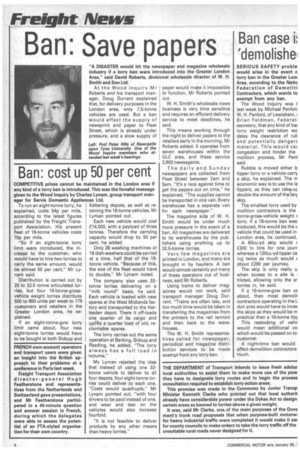Ban: Save papers
Page 8

If you've noticed an error in this article please click here to report it so we can fix it.
"A DISASTER would hit the newspaper and magazine wholesale industry if a lorry ban were introduced into the Greater London Area," said David Roberts, divisional wholesale director of W. H. Smith and Son Ltd.
At the Wood Inquiry Mr Roberts and his transport manager, Doug Durrant explained that, for delivery purposes in the London area, only 7.5-tonne vehicles are used. But a ban would affect the supply of newsprint and paper to Fleet Street, which is already under pressure, and a slow supply of
Left: Prof Peter Hills of Newcastle upon Tyne University. One of the Wood Inquiry members who attended last week's hearings.
paper would make it impossible to function, Mr Roberts pointed out.
W. H. Smith's wholesale news business is very time sensitive and requires an efficient delivery service to meet deadlines, he said.
This means working through the night to deliver papers to the retailers early in the morning, Mr Roberts added. It operates from seven warehouses within the GLC area, and these service 2,800 newsagents.
The daily and Sunday newspapers are collected from Fleet Street between 2am and 5am. "It's a race against time to get the papers out on time," he explained. "The supplies cannot be transported in one van. Every warehouse has a separate van for each newspaper."
The magazine side of W. H. Smith would be under much more pressure in the event of a ban. All magazines are delivered to its warehouses by the publishers using anything up to 32.5-tonne lorries.
Very few magazines are printed in London, and many are brought in by hauliers. A ban would almost certainly put many of these operators out of business, said Mr Roberts.
Using trains to deliver magazines would not work, said transport manager Doug Durrant. "Trains are often late, and too much time would be taken in transferring the magazines from the printers to the rail termini and then back to the warehouses.
The W. H. Smith representatives called for newspaper, periodical and magazine distribution services to be made exempt from any lorry ban.
























































